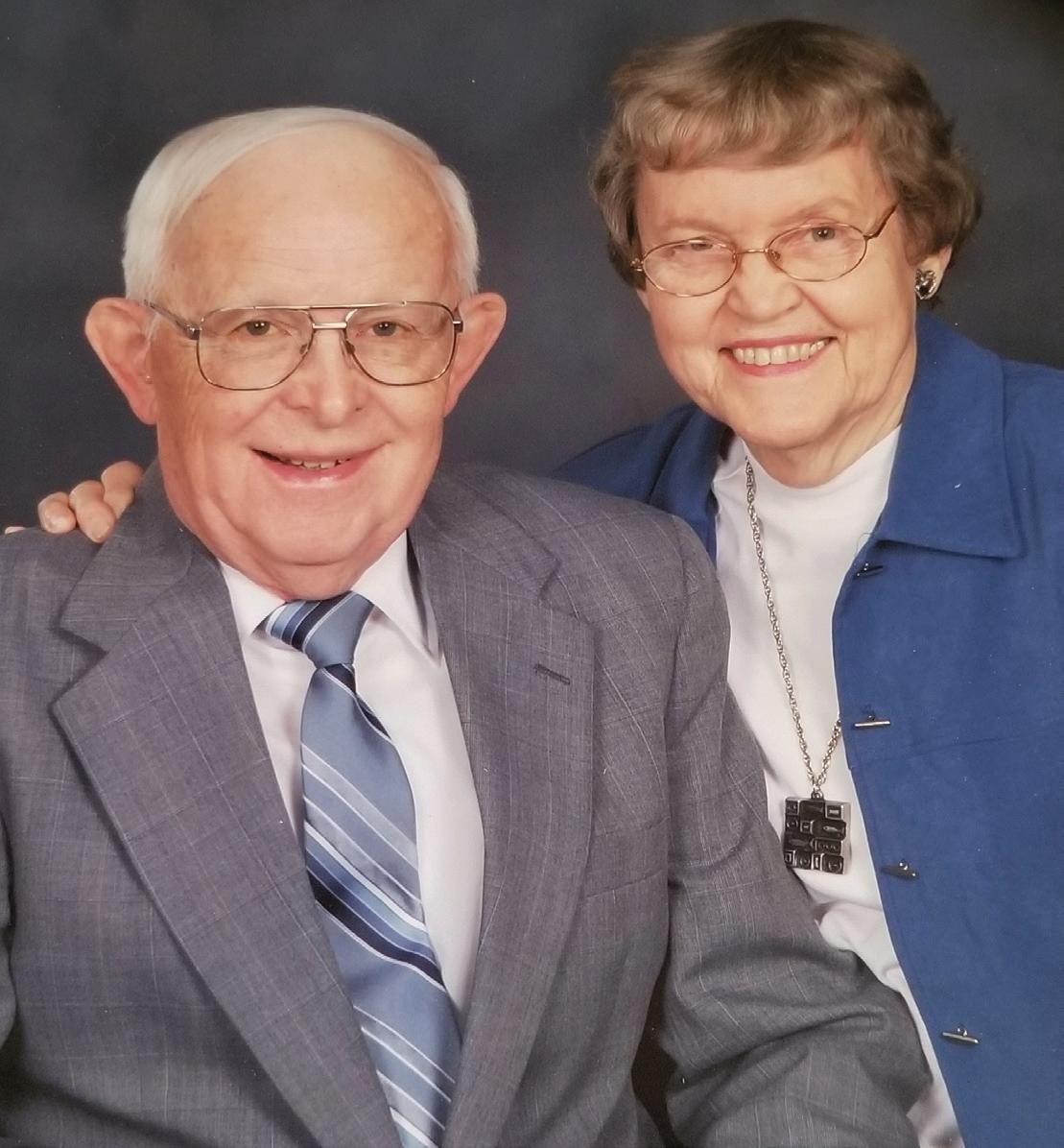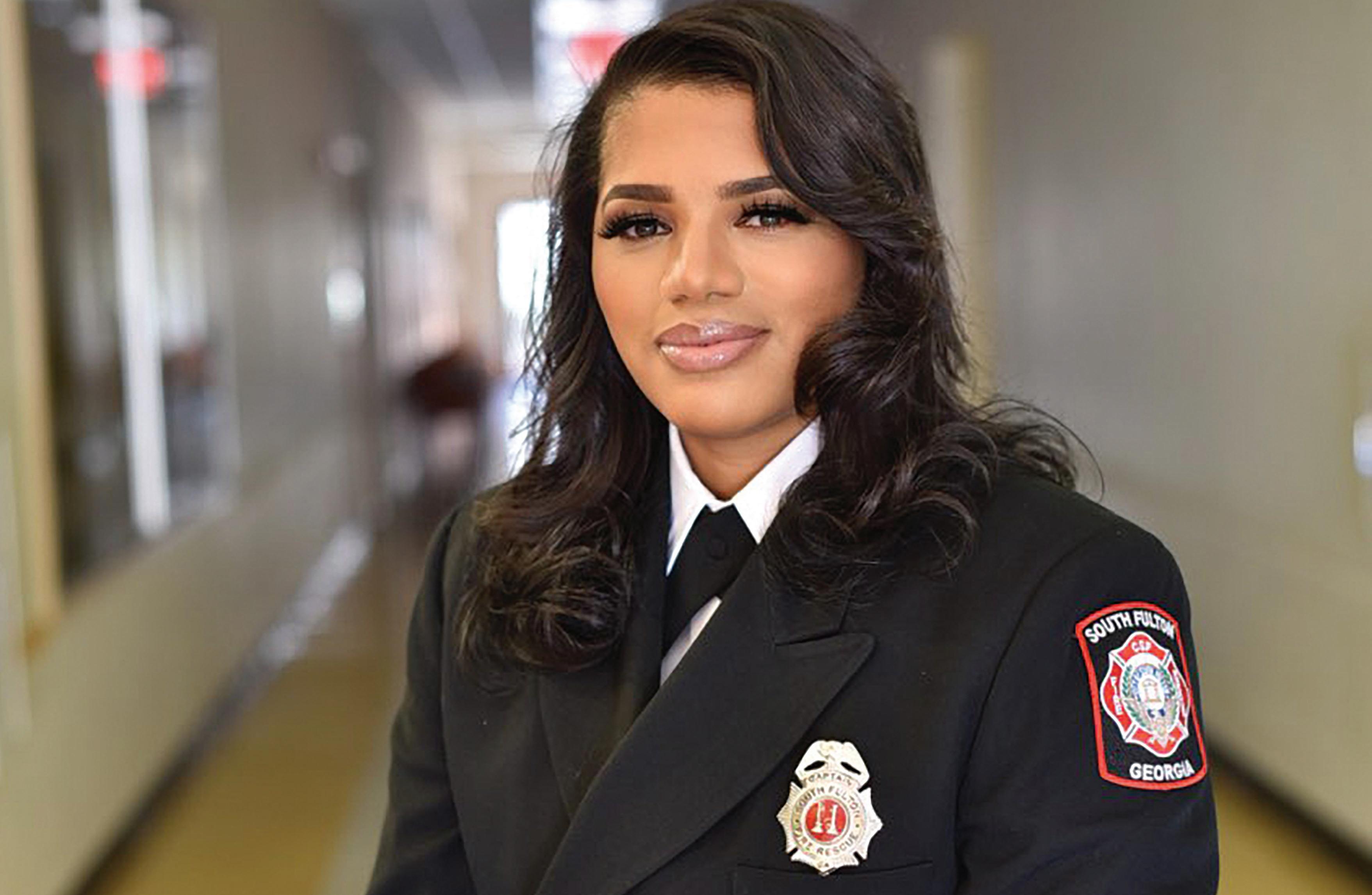
7 minute read
Alumni Profile: Remembering a Legend
Remembering a Legend
PHOTOS FROM WALDORF ARCHIVES, KARI HAMRE & SUMMIT TRIBUNE
Advertisement
For our family, Jim and Corrine Hamre are forever embedded as part of Waldorf’s rich living history. In the fall of 1993 when we arrived, they were among many regarded as the foundation of Waldorf who took us under their wings. Jim shared with us highlights of Waldorf’s past, speaking with reverence for Waldorf only as someone with deep faith in and love for the institution could. Both he and Corrine regularly connected with us during their time at Immanuel Lutheran Church, typically to ask about the wellbeing of our family and what was happening to move the college forward. Every conversation was bathed in encouragement–always smiling, always genuinely interested, always exuding love. After learning our oldest was an Elvis fan, they periodically sent him postcards or souvenirs from their winter travels through Memphis. The Hamres, for us, exemplify what has made Waldorf special.
-MARK NEWCOM, M.A. ASSOCIATE PROFESSOR OF COMMUNICATION, DIRECTOR OF DIGITAL MEDIA Retired Waldorf Professor Dr. James Hamre, 89, died January 3, 2021 in a hospital in St. Petersburg, Florida. Dr. Hamre joined the Waldorf faculty in 1967 as a professor of religion and philosophy. He taught full-time until 1994 and part-time until 1999. He was also considered Waldorf’s historian. Dr. Hamre authored “Continuity and Change: 100 Years – Waldorf College” which was published in honor of Waldorf’s centennial in 2003. Dr. Hamre positively influenced many Waldorf students over the years through his memorable courses. Dr. Hamre and his wife, Corrine, were also incredibly welcoming and encouraging to new staff and faculty. The Hamre’s two daughters, Kristin ’77 and Kari ’82, are graduates of Waldorf.

Jim was one of the first to welcome me to the Waldorf faculty when I arrived on campus in the fall of 1981 – so many years ago! Always the consummate gentleman, he was so friendly, respectful, humble, and encouraging, with a perpetual warm smile (qualities that seem to be fleeting these days). Jim and his wife, Corrine, were very supportive and eager to help whenever and however they could. After the passing of my first wife early in my career at Waldorf, they entertained my young daughter and me at their home for occasional meals. The atmosphere was relaxed, conversation engaging, and food so good!
I never had the occasion to visit one of Jim’s classes, but I remember that he held high expectations for his students and hearing students appreciate his teaching. In addition to teaching, though, Jim was also a scholar. He wrote a fine history of Waldorf College for the College’s Centennial celebration, a work for which he came to be known as “Waldorf’s Historian”. Jim also published a number of peer-reviewed articles, including at least one critical piece on the creationist movement. Some tension existed over certain topics of science in those years, but I was happy and relieved to learn that Jim and I shared so many common views – we interacted a lot on the theme of science and religion. I was happy to have a strong rapport with a theologian of Jim’s stature.
Finally, Jim was “old school” – a high compliment. He had high academic expectations for his students and for himself. He respected others and enjoyed respect from his colleagues. To me, Jim embodied what I viewed as a “professor” and “academic” – not just for Waldorf, but of higher education, in general. What a fine example.
-PAUL BARTELT, PH.D., PROFESSOR OF BIOLOGY
Recently I have been reflecting on some of the influential people who have had a significant impact on my life. Near the top of that list would be Dr. James Hamre. He taught me not only the discipline of philosophy, but more importantly, he taught me to love philosophy and integrate its tenets into my life.
Dr. Hamre was the quintessential college professor. Every Monday, Wednesday, and Friday morning, he arrived at the appointed time wearing a suit and tie—his standard attire for as long as I can remember. Classes were held in the old Annex—a World War II barracks acquired from a POW camp in Algona.
The first day, he proceeded to tell us that the word “philosophy” derives from the Greek “Philos” which means “love” and “Sophia” which means “wisdom.” He also intimated that “Sophia” or wisdom was “feminine” and I felt at home in class despite the inordinate male presence all around me—there was only one other woman in class! It was owing to his pervasive influence that I eventually decided to major in philosophy at Augustana College and was only the second woman in the history of the college to choose philosophy as a major…an interesting, but perhaps dubious distinction!
My recollection concerning his pedagogy was that whenever he presented a new philosophical idea or construct, he always presented it in such a way as to be worthy of consideration. He would outline the basic tenets of Protagorean Relativism so that it seemed logical and rational, but when he presented the next philosophical school of thought, it would be apparent that there were limitations or flaws inherent in the initial idea and the student would be well advised to re-think the original premise. He didn’t identify the weaknesses, but invited the student to examine the various philosophies and reach their own conclusions. He never told us what to think—he invited us to critically examine the various philosophies and decide for ourselves which ones were the most tenable.
Perhaps one of the greatest gifts I received from Dr. Hamre’s class was a sterling set of ethical principles to abide by. Not only did he teach these principles, but he exemplified them. He was the embodiment of an ethical person with a strong moral compass. I experienced this attribute not only when I was a student in his class, but his character was revealed to me later as one of my most esteemed colleagues. I prevailed upon his wisdom and acumen on numerous occasions and he could always be counted upon to render a sage and insightful decision. In the words of another of my classmates, Paul Johnson, Dr. Hamre was always measured and articulate.
I learned that the pursuit of truth can be a perilous path, but even though the path be strewn with difficulties, I have learned not to depart from it—what a valuable lesson. I will forever appreciate what Dr. Hamre taught me about philosophy; what it means to be a person with ethical standards and integrity; and for teaching me about life. His lessons are cherished daily.
Along with my philosophical mentor, Socrates, I would say this: “No evil can befall a good man either in life nor after death.” Dr. Hamre was an eminently good man and we are all the better for having known him.
-JULIENNE FRIDAY ’68, M.A. PROFESSOR OF SOCIOLOGY AND PSYCHOLOGY
I had the honor of knowing Dr. Hamre both as a professor and as a colleague.
Dr. Hamre was an excellent religion professor. As a Waldorf AA student in the 1970s, I had a religion class from Dr. Hamre in the old art building (where the Hanson Library currently stands). He was what I would call an “old school” professor who had high standards for himself and for his students: Sit up straight, two feet on the floor, no caps.
When I started teaching at Waldorf in 1988, Dr. Hamre was welcoming to me as a new faculty member and remembered me from my student days. When he retired, he told the assembled faculty and staff at the year-end dinner that he was making way for “someone who better understands the MTV generation.”
The other thing I remember about Dr. Hamre was the chapel talks that he and Dr. Richard Baur would have close to the Ohio State-Michigan football game. Each would extol the virtues of his respective school. Their barbs were pointed but friendly and people got a real kick out their back-and-forth banter.
-DAVID DAMM ’73, M.A. PROFESSOR OF COMMUNICATIONS, PROGRAM DIRECTOR COMMUNICATIONS ONLINE, HONORS COLLEGE ADJUNCT FACULTY When I first came to Waldorf in the fall of 1965, Ingebretson and Bruland were the two professors of religion. Following them were Hamre and Bauer, the next two professors of religion at Waldorf. Bauer with his pipe, jogging, and University of Michigan cap; Hamre with his stoicism, his dry sense of humor, and if I remember correctly, his Minnesota connection; and together making quite a unique, interesting, and enjoyable pair. I recall them speaking in chapel, (which was held every week day) probably on average, once a month, and the audience loving them as they humorously made comments on each other’s previous sermons and Alma Mater, in addition to a usual excellent homily.

Jim was a true theologian, a gentle soul, had a great sense of dry humor, always complimentary, hardly ever judgmental, had a great demeanor, and gave thorough lectures to his students. Jim, in the true sense, was a “Professor’ of religion.
-REVEREND DAVID BOLSTORFF, FORMER PROFESSOR OF RELIGION, CHAPLAIN AND FOOTBALL COACH










